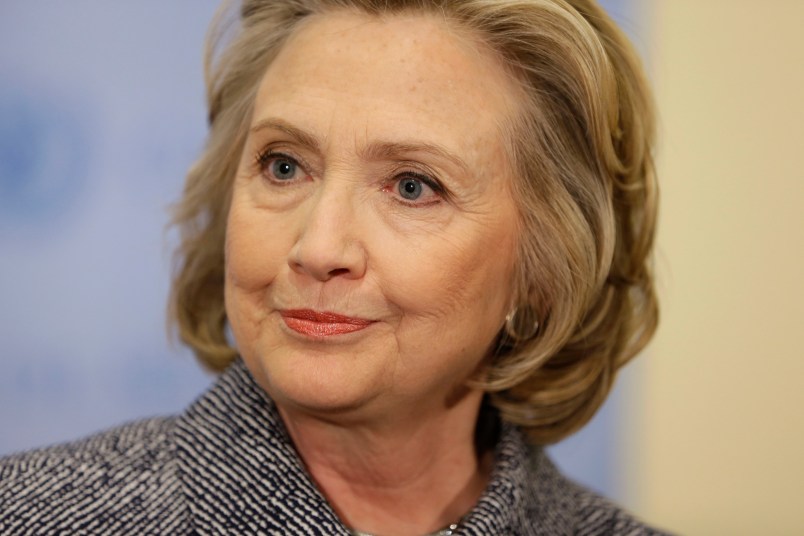I don’t yet know for sure who I’m voting for in the 2016 presidential election. As much as I prize the GOP primaries’ entertainment quotient, I’m probably voting for the Democratic candidate, because my first question on these matter is “Which candidate takes climate change most seriously?”
But I am not excited about Hillary Clinton. At all.
Very little about Clinton’s policy positions animates me—other than her strong support for early childhood education (which is my professional expertise), I don’t find her substantively compelling. Indeed, I find her hawkish approach to foreign policy repellent.
But I also have a daughter. And want very much to be able to say that I voted for the first American Madame President. Just as importantly, I want that first female presidency to come to the country as soon as possible.
And yet: That is clearly offensive and patronizing. There’s something wrong with a straight white male voter who tells himself that he should vote for the female candidate simply because she has a strong chance of becoming the first female president. Put Hillary Clinton’s positions in a typically WASP-y male candidate’s body and I wouldn’t vote for him. That hypothetical Howard Clinton, a hawkish blue dog candidate descended from an American political dynasty, wouldn’t be a frontrunner for my vote—or for the votes of many left-leaning voters.
But back to that other hand, it’s pretty pointless to make the WASP-y male comparison. There is obviously something right about acknowledging glass ceilings and acting to break them (insofar as the thin and, in some ways, meaningless act of casting a presidential ballot in the District of Columbia is an “act”). That is, it’s facile to pretend as though Clinton’s gender can be taken out of the campaign and the decisions of voters like me. We have 44 male presidents serving as strong precedent to show that gender equality in the Oval Office may require a campaign that makes “First Female President” an electoral season’s dominating consideration.
Step back for a moment and think that over. Think about the cynicism involved in choosing either of those trains of thought. What is it to be strung between holding Clinton to account for her positions and holding one’s nose to make a profoundly important point about gender equity in the United States?
But that’s the meaningful choice for left-leaning American voters. The Republicans remain unlikely to nominate a candidate who meets even the basic qualifications for seriousness on big issues like climate change, economic inequality, social mobility, and more. And Jim Webb, Joe Biden, Martin O’Malley, Andrew Cuomo, Bernie Sanders, and hyper-imaginary candidate Elizabeth Warren remain fallback options only if Clinton self-destructs. It should go without saying that those fallback choices—like protest votes for the Green Party and like self-righteous centrism emanating from efforts like No Labels—are extremely unlikely to be viable. They are not meaningful choices.
Why track out all this basic rationale from Political Science 101? Perhaps it’s just to offer further proof that the act of voting in a two-party presidential system is better understood as a matter of personal symbolism than as the staking of a substantive position. It’s about working out how voting a particular way squares with who you understand yourself to be, and how you feel about your place in your political community. Once you’ve conclusively ruled out one of the two major parties, you’re more or less stuck trying to find a way to see yourself and your ideals in the remaining party’s candidates. That’s why supporting a flawed Clinton campaign feels so wrong, even if it is the most right that we have reasonable license to expect.
Conor P. Williams, PhD is a Senior Researcher in New America’s Early Education Initiative. Follow him on Twitter @conorpwilliams. Follow him on Facebook.







And here comes the gender questions which are irrelevant, since she’s not a man, and no man is proposing any ideas or counters to her position. So what’s the point in asking? There is no point other than to ask if a man would vote for THIS woman. As if the white male structure can prescribe one’s ballot in their stead. The silly show and micro analysis has started. They haven’t even started on the legitimacy of Ted “Smirky Smurf” Cruz and they go right in on Clinton. Good, she’ll need hardening up. Keep Bill out of the picture. Despite any monikers, he’s not black and does not carry ANY black agency. Tell him to shut up and keep it short and sweet and about YOU. As for the GOP, by the time they rip each other to shreds, all you’ll have are the religious freaks, and they number some 30-33%. The fodder of the GOP. Because by the time they are done, they will have no choice but to go xenophobic, and that will simply be the end of them. Watch, you’ll see.
Wait – she’s not?
Hillary is a Dem. Her opponent will be a Republican. I would vote for Hillary if she were a marmoset.
I didn’t support Obama because he was black, or to make history. I voted for Obama because he had been against the Iraq War, and because I hoped we’d get the kind of President we seem to be getting in the last two years of his term. (Though more and more the ACA seems like the BFD Biden called it.) I will vote, as I always try to do, for the candidate who promises to pursue (most of) the policies that I support, and has a chance to win. If that candidate’s a woman, so much the better. But if a politically savvy grapefruit comes along and promises real action on AGW, for example, I’m gonna consider him/her/it.
’ Old Boys Club ’ - they don’t want a women telling them what to do . ( She might find a few skeletons in the closet ) .